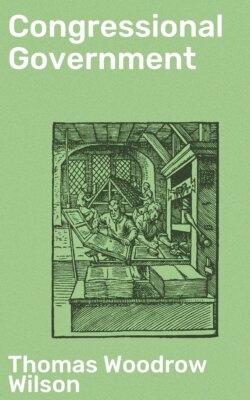Congressional Government

Реклама. ООО «ЛитРес», ИНН: 7719571260.
Оглавление
Thomas Woodrow Wilson. Congressional Government
Congressional Government
Table of Contents
A STUDY IN AMERICAN POLITICS
WOODROW WILSON
The Riverside Press Cambridge
His Father,
This Book
*
PREFACE TO FIFTEENTH EDITION
PREFACE
CONGRESSIONAL GOVERNMENT:
Footnotes
Footnotes
Footnotes
Footnotes
Footnotes
Footnotes
INDEX
Отрывок из книги
Thomas Woodrow Wilson
Published by Good Press, 2020
.....
Keeping pace, too, with this growth of federal activity, there has been from the first a steady and unmistakable growth of nationality of sentiment. It was, of course, the weight of war which finally and decisively disarranged the balance between state and federal powers; and it is obvious that many of the most striking manifestations of the tendency towards centralization have made themselves seen since the war. But the history of the war is only a record of the triumph of the principle of national sovereignty. The war was inevitable, because that principle grew apace; and the war ended as it did, because that principle had become predominant. Accepted at first simply because it was imperatively necessary, the union of form and of law had become a union of sentiment, and was destined to be a union of institutions. That sense of national unity and community of destiny which Hamilton had sought to foster, but which was feeble in his day of long distances and tardy inter-communication, when the nation's pulse was as slow as the stage-coach and the postman, had become strong enough to rule the continent when Webster died. The war between the States was the supreme and final struggle between those forces of disintegration which still remained in the blood of the body politic and those other forces of health, of union and amalgamation, which had been gradually building up that body in vigor and strength as the system passed from youth to maturity, and as its constitution hardened and ripened with advancing age.
The history of that trenchant policy of “reconstruction,” which followed close upon the termination of the war, as at once its logical result and significant commentary, contains a vivid picture of the altered balances of the constitutional system which is a sort of exaggerated miniature, falling very little short of being a caricature, of previous constitutional tendencies and federal policies. The tide of federal aggression probably reached its highest shore in the legislation which put it into the power of the federal courts to punish a state judge for refusing, in the exercise of his official discretion, to impanel negroes in the juries of his court,[11] and in those statutes which gave the federal courts jurisdiction over offenses against state laws by state officers.[12] But that tide has often run very high, and, however fluctuating at times, has long been well-nigh irresistible by any dykes of constitutional state privilege; so that Judge Cooley can say without fear of contradiction that "The effectual checks upon the encroachments of federal upon state power must be looked for, not in state power of resistance, but in the choice of representatives, senators, and presidents holding just constitutional views, and in a federal supreme court with competent power to restrain all departments and all officers within the limits of their just authority, so far as their acts may become the subject of judicial cognizance.”[13]
.....